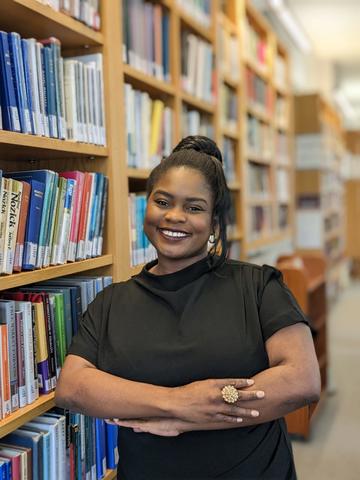Luena Ricardo, co-founder of Soul Chord

Luena is a student in the second year of her MPhil in Global and Area Studies at Linacre College, Oxford. She is a co-founder of SoulChord, a pioneering soon-to-be start-up integrating AI into wellness services, especially in the realm of music therapy. Luena and her team acknowledge that music is an integral part of well-being and believe that they are uniquely positioned to offer music therapy services to a wider public, considering the existing gap in music therapy services and the significant demand for such offerings. They are developing a product that will allow them to realise their desire to enhance people’s lives through music therapy.
Before pursuing an MPhil in Global and Area studies at Oxford, I obtained a Bachelor’s in Law and a Master’s in International Economics, Business and Cultural Diplomacy. My decision to become an entrepreneur came from a desire to understand in practice how entrepreneurship worked after having academic experience with it in the past. I wanted to experience the things that I had learned beyond conceptualisation. I also wanted to integrate my passion for social impact, academic insight and leadership skills into solutions that would allow me to address real-world problems.

To me, entrepreneurship is pursuing innovative and transformative solutions to societal challenges through innovation, perseverance, and a deep understanding of human needs. It is seeing beyond the status quo, daring to dream big, and being disruptive. It requires the resilience to turn your dreams into reality.
When I joined my team at Oxford's StEP programme, my teammates had already conceptualised an idea that immediately resonated with me. We collaboratively developed this idea throughout the programme, driven by our shared recognition of the vast market for well-being solutions. There, through research, we observed the significant gap in the availability of music therapists globally. Beyond that, according to the WHO, approximately a billion people are grappling with mental health issues worldwide, and the urgency to address this gap has become clear to us. We saw an opportunity not just to enter the market but to make a difference in people's lives. Our response to this challenge was to create an AI-powered alternative to traditional music therapy. This innovative approach will allow individuals to experience the benefits of music therapy through technology, effectively bridging the gap we identified in the market. This was the perfect moment to act.
A good entrepreneur should be able to adapt not only to different markets but also to consumer needs and technological advances in their field. I believe that success begins with envisioning a future in solutions that others did not think about or did not think about to the same extent that you have. Another key quality is ensuring that your solutions have a human-centric approach. The human should be at the centre of the things you want to do.
One of my favourite things is the fact that, as an entrepreneur, you are able to create and innovate. It is great to see an idea evolve from a concept that, with the right team and the right resources, can positively impact people’s lives. This allows us, as entrepreneurs, to experience a journey: a journey of self-knowledge, learning and growth, and the opportunity to work with others from different backgrounds towards a common goal. This is amazing.
Personally, I am very passionate about social entrepreneurship, so I felt really inspired when watching a documentary about Muhammad Yunus. He is the founder of Grameen Bank and is a Nobel Prize winner. He has revolutionised the way in which we think about social and economic development. He lends loans to small entrepreneurs and people in poverty, people who do not have the possibility to get loans from traditional banks. So, he showcased how innovative finance models could create impact and generate social change. His values are definitely aligned with my own passion for integrating social insight into solutions.
I would focus on understanding how he bridged the gaps between academic knowledge and his first-hand experience with entrepreneurship. I would ask him how he translated his academic knowledge into practising micro-financing and what the key challenges he faced during this transition were. I would also like to know how he overcame them, how he foresaw the long-lasting impact of initiatives like his, and how he managed to balance the financial aspect of running a successful business whilst also being mindful of the social objective.
I participated in a programme of the Oxford University Innovation called StEP. During this programme, I joined a team that who wanted to use music to positively impact the world, and felt I was taking on a social responsibility. Participating in this connected me with the team, and I was enlightened by them. I started to share the vision of the product they wanted to unveil to the world. At the end of the programme, we had a pitching competition, where nine start-up groups, all created by University of Oxford students, pitched to investors. We won the best pitch prize and received funding to start building our startup. It was truly an amazing moment.
One thing I have learned is that you really cannot underestimate the time taken for development. Ideas have to evolve with the ever-changing world, and you need to use this ability to adapt. You need to be resilient to understand that your solutions will sometimes need to change. Another lesson in our short but meaningful journey so far was learning to balance our vision and really focus on the adaptability of this vision. I know now that you cannot be too rigid in what you foresee for your company; you must take a step back to understand what your user needs, incorporate a human-centric approach, and be aware of the resources you have in order to reach the goal you want to reach. All of this is possible with resilience and adaptability.
Yes. I participated in a programme in Oxford, through the Oxford University Innovation, called StEP. This programme is tailored for University of Oxford students. It offers a collaborative environment to allow students to receive comprehensive training, mentorship, and also dedicated workshops towards creating entrepreneurial training. In this workshop, you can participate in three ways: you can come up with your creative business idea with a fully formed team and grow through the programme. You can also benefit from training to build a team to nurture a pre-existing idea not yet explored, or, lastly, you can come without any business idea, and join any of the projects presented there. After winning the pitching competition that happened at the end of this programme, we won 15.000 GBP.
The university offers many opportunities to tap into the entrepreneurial talent at Oxford on various levels. In this regard, I was privileged to have taken advantage of the university’s entrepreneurial ecosystem. One really nice thing about Oxford is that there is not necessarily one centralised focus for entrepreneurship. Rather, there are various places within the university where you can seek contributions and opportunities to participate in entrepreneurial activity. I participated in StEP, for example, from the Oxford University Innovation. There is, of course, Enspire, another initiative to improve diversity in entrepreneurship. The Said Business School is also a hub for entrepreneurs in the university and promotes various workshops and presentations related to entrepreneurship. So far, participating in these initiatives granted us unforgettable experiences. We even went to Berlin to pitch our start-up as representatives of the University of Oxford. This was remarkable, and we now have connections with entrepreneurs in so many other locations.
As Oxford students, however, we also face high expectations and a lot of competition in such a prolific and bustling environment for entrepreneurship. We must also be mindful of our time and enjoy opportunities in a timely manner, which can be challenging. If you lose the timing of things, you can lose the opportunity, so it is important to be mindful of that.
As an Oxford University student, there are many. To begin with, you can look at the programmes and opportunities at Oxford University Innovation. They have amazing resources relating to fostering projects created within the university. You have the possibility of joining their Incubator, as well as their workshops. You can work on projects you are bringing to the table or on others that were created by other people at the university. There are many possibilities to scale up projects. I highly recommend the many opportunities that Enspire has, especially if you are a minority and wish to set your place within the Oxford system. The Said Business School also has many opportunities and workshops for the wider public and might inspire you to work on your own project. There are also Oxfordshire programmes that motivate people to become entrepreneurs and foster their ideas. In the library at Westgate, they have a prolific community which hosts workshops, learning opportunities, and “all things entrepreneurship”!
I was fortunate enough to be in an environment where I found programmes and people celebrating our many intersections. I acknowledge that, in a broader sense, we as women need to always take care of biases some may have towards us. We must also fight the impostor syndrome, especially as a woman venturing into an AI startup. But let’s remind ourselves that this is a journey, and, being a journey, we are allowed to work on our mistakes and learn from them. With this, we will be able to grow. This is important for us as women and members of sociologically speaking minority groups.
Resilience is key. We also need to be strategic; with strategy, we can handle the challenges of being a female entrepreneur willing to change the world. You must be in sync with your team and understand how best to realise a vision. A journey of entrepreneurship is one of continuous learning. We don't always have all the answers, and that is ok. Focus on the impact you seek to have, with the human in the centre. It is not only about profit but about the impact on the lives you transform with the solutions you create.



